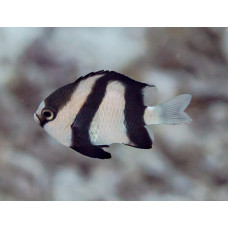Latin name
Dascyllus abudafur
Other names
Banded Dascyllus, Banded Humbug, Black-and-White Damselfish, Black-and-White Humbug, Common Humbug, Humbug, Humbug Damsel, Humbug Damselfish, Stripe Damsel, Stripe Damselfish, Threestripe Damsel, Threestripe Damselfish, Three-striped Damsel, Whitetail Damsel, Whitetail Dascyllus, White-tailed Damsel, White-tailed Damselfish, White-tailed Footballer, Zebra Humbug.
Identification
The species name is derived from the Arabic word for the species, Abu-dafur Jabûd. Males are not distinguished from females by any conspicuous markings or characteristics.
Features of fish fins
They have a two-lobed tail fin.
Fish colouring
This species is characterized by white pigmentation with three transverse black stripes; caudal fin with a gray or blackish spot (unlike the all-white Pacific relative Dascyllus aruanus).
Distribution
Occurs from the Red Sea along the coasts of East Africa to South Africa, Seychelles, Comoros, Madagascar and the Mascarene Islands east to the Sunda Islands.
Habitat
A marine, tropical, reef associated species. They live at depths of 0 - 30 meters, at temperatures of 71.6 °F - 82.4 °F (22°C - 28°C).
Size
The body length reaches 6.4 centimeters.
Behavior
Territorial, can be quite aggressive with each other and other inhabitants.
Food and feeding habits
The main diet of the Indian Ocean humbug consists of zooplankton.
Reproduction
Does not breed in captivity. Egg-laying fish. First they clear a place for a nest, then they perform a mating dance, swimming fast and moving their fins. During this time the males often darken a few shades and white spots may appear. Spawning occurs at dawn.
Fishing
It has no commercial value.
Relationship with a person
A species not harmful to humans. Used in aquariums.
| Classification | |
| Phylum | Chordata |
| Class | Actinopterygii |
| Family | Pomacentridae |
| Genus | Dascyllus |
| Species | D. abudafur |
| Features | |
| Conservation status | Not Evaluated |
| Habitat | Pelagic |
| Life span, years | No information |
| Maximum body weight, kg | No information |
| Maximum length, cm | 6,4 |
| Sailing speed, m/s | No information |
| Threat to people | Not edible |
| Way of eating | Planktonophage |
Indian Ocean humbug
Tags: indian ocean humbug

